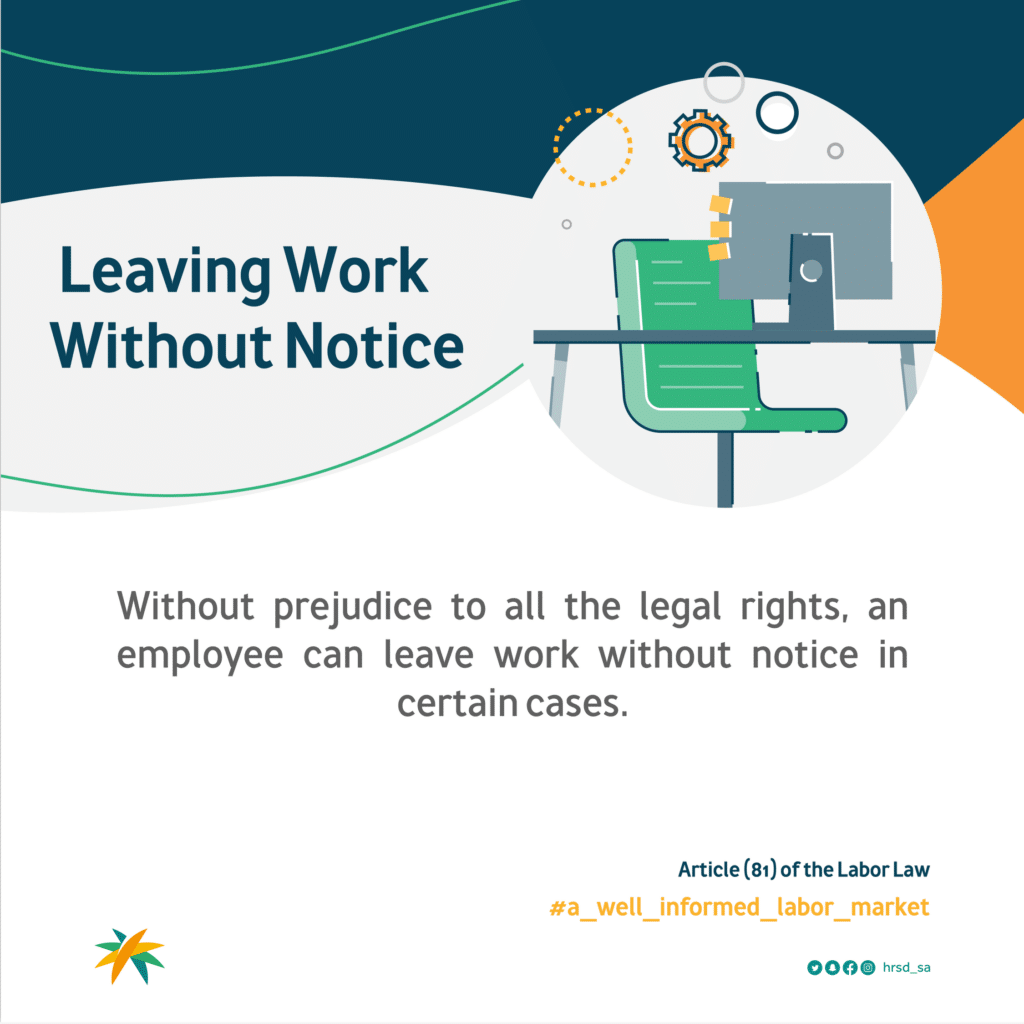Understanding the Rights of Employees to Leave Without Notice
In any employment relationship, both the employer and the employee have certain rights and obligations that they must adhere to. These are usually defined in the employment contract or by applicable laws and regulations. While an employee is typically required to provide a notice period before leaving a job, there are certain circumstances where an employee may leave without notice. In this article, we’ll take a look at the situations where an employee may leave without notice and what it means for both the employee and the employer.
The Labor Law of Saudi Arabia provides certain provisions that allow employees to terminate their employment contracts without notice in specific situations. These provisions are designed to protect the employee from situations where they are unfairly treated, abused, or subjected to unsafe working conditions. Let’s take a closer look at each of these situations.

Failure to fulfill essential obligations
An employee may leave without notice if the employer fails to fulfill their essential contractual or statutory obligations towards the employee. For example, if the employer fails to pay the employee their salary or compensation, or does not provide the agreed-upon benefits, the employee may terminate their contract without notice.
Fraud at the time of contracting
If the employer or their representative resorts to fraud at the time of contracting regarding the work conditions and circumstances, the employee may leave without notice. For example, if the employer misrepresented the job description, work hours, or other terms and conditions of the contract, the employee may terminate the contract without notice.
Unauthorized change in work
If the employer assigns the employee, without their consent, to perform a work which is essentially different from the work agreed upon and in violation of provisions of Article (60) of the Labor Law, the employee may leave without notice. This provision protects employees from being forced to perform duties that are outside their skill set or experience and that may put them in danger.
Violence or immorality
If the employer, a family member, or the manager in-charge commits a violent assault or an immoral act against the employee or any of their family members, the employee may leave without notice. This includes physical violence, sexual harassment, or any other form of abuse that may cause harm to the employee or their loved ones.
Cruelty, injustice, or insult
If the treatment by the employer or the manager in-charge is characterized by cruelty, injustice or insult, the employee may leave without notice. This provision protects employees from being subjected to unfair treatment or harassment, such as discrimination, bullying, or offensive behavior.
Serious hazard to health and safety
If there exists in the workplace a serious hazard threatening the safety or health of the employee, provided that the employer is aware thereof but fails to take measures indicating its removal, the employee may leave without notice. This provision protects employees from being exposed to dangerous or unhealthy working conditions that may put their health or safety at risk.
Unjust treatment or violation of terms of the contract
If the employer or their representative, through their actions and particularly, their unjust treatment or violation of the terms of the contract, has caused the employee to appear as the party terminating the contract, the employee may leave without notice. This provision protects employees from being falsely accused of breaching their contract and being held responsible for the termination of the employment relationship.
Conclusion
In some situations, employees have the right to leave their job without giving notice to their employer. These situations occur when the employer has violated the employee’s rights or failed to fulfill important legal or contractual obligations. For example, if the employer has treated the employee unfairly or in a cruel manner, or if they have created an unsafe work environment, the employee may be allowed to leave the job without giving notice. In addition, if the employer has committed a serious breach of the contract, the employee may also be able to leave without notice. It is critical for employees to know their rights in these situations and to seek legal advice if they are unsure. Employers should also ensure they are treating their employees fairly and following all applicable laws and contractual obligations.
More from KSAexpats.com:







